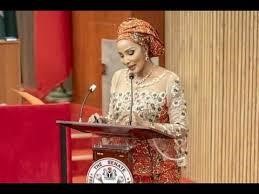By: Kebba AF Touray
Madam Bionga Ojukwu, Minister of State for Foreign Affairs of the Republic of Nigeria, has challenged the Economic Community of West African States (ECOWAS) to accelerate the realisation of a single currency for the region.
Speaking on behalf of the Chairman of the ECOWAS Authority of Heads of State and Government, Nigerian President Bola Ahmed Tinubu, Madam Ojukwu acknowledged the region’s persistent challenges, including political instability and the impacts of climate change. Nevertheless, she affirmed ECOWAS’s resilience in confronting and, where possible, averting such challenges.
“In deepening our integration, we must accelerate the realization of a single currency and strengthen infrastructure corridors to connect markets and minds,” Madam Ojukwu urged.
She reflected on ECOWAS’s bold founding vision, established on May 28, 1975, by the region’s founding fathers.
“We celebrate five decades of progress, unity, and resilience, and rekindle the flame of solidarity that has guided our region through trials,” she said.
Over the last fifty years, Madam Ojukwu highlighted, the 15 ECOWAS member states have envisioned regional cooperation, economic integration, and shared prosperity. Emerging from the legacy of colonialism and the turbulence of post-independence struggles, they forged ECOWAS as a beacon of hope for the people of West Africa.
“Their dream was not merely to dissolve borders, but to build bridges of trade, cultural exchange, and mutual progress,” she noted. “From the original Treaty of Lagos in 1975 to this momentous gathering, ECOWAS has remained a pillar of integration and a symbol of hope for over 400 million citizens across our region.”
She acknowledged that the journey has not been without challenges—political instability, economic hardship, infrastructure deficits, and security threats—but reiterated that the bloc remains undaunted.
“We must not relent in our commitment to a united, peaceful, purposeful, and prosperous West Africa,” she declared.
Madam Ojukwu outlined several of ECOWAS’s achievements over the past five decades: Establishment of one of Africa’s most vibrant free trade areas, fostering intra-regional commerce and lifting millions out of poverty; Promotion of peace through ECOMOG’s valiant efforts in conflict mediation in Liberia, Sierra Leone, and The Gambia; Introduction of the ECOWAS passport, symbolizing the commitment to free movement; Advancement of democratic norms and resistance to tyranny through support for constitutional governance.
Yet, she stressed, the journey toward a truly united and prosperous West Africa is far from complete.
“Despite our shared vision, too many of our citizens still live in poverty. Too many children lack access to quality education. Too many of our youths remain unemployed, disillusioned, or forced to seek opportunities abroad,” she lamented.
She also cited violent extremism, climate change, food insecurity, and unconstitutional changes of government as ongoing threats that jeopardize hard-won democratic gains.
Reaffirming Nigeria’s commitment to the values of democracy, rule of law, good governance, and regional solidarity, Madam Ojukwu emphasized that these are not merely ideals but foundations for peace, development, and human dignity.
“In this new chapter, we must reimagine ECOWAS not just as a community of states, but as a community of people. We must place our young, dynamic, and creative population at the center of our agenda. We must invest in education, innovation, and skills development to unleash the full potential of Africa’s future,” she said.
She challenged the region to expand the frontiers of democracy, limit unconstitutional rule, and always seek peaceful collaboration as a pathway to development.
“We must also deepen our economic cooperation, support intra-regional trade, and ensure that the African Continental Free Trade Area becomes a vehicle for genuine transformation,” she stated. “A prosperous West Africa is good for Africa and the world.”
Finally, Madam Ojukwu called on ECOWAS member states to use the Golden Jubilee as a moment of renewal—to rededicate themselves to the spirit of Pan-Africanism that inspired the founding fathers—and build an ECOWAS that is more resilient, inclusive, and responsive to the needs of its people.


















